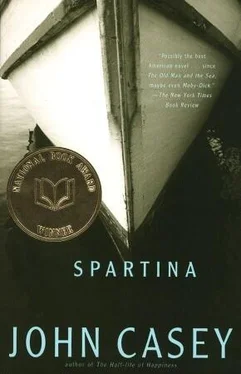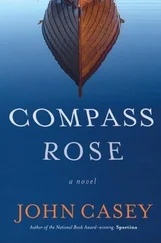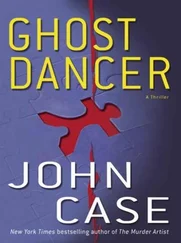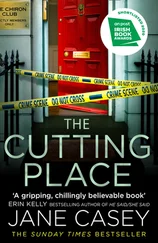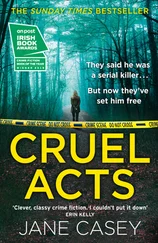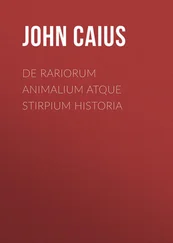He held on for another hour. He tried jigging and jogging in place to get his blood moving. It pepped him up some but at the same time made him feel more lightheaded. He began to fear he was just going to give way. The fear sent a ripple of energy through him, but it wasn’t enough.
At last he recognized that he was done, that he’d have to put all his trust in her. He slipped the loops of inner tube over the spokes, cut back on the throttle to idle, and broke out the sea anchor from the one intact starboard locker. He put her in neutral. He tucked the bulky canvas and the stiff hemp bridle and line under one arm and went out the door. Just aft of the wheelhouse he clipped onto the lifeline and made his way onto the foredeck. When he glanced at the wheelhouse he saw that the paint looked like it had been sandblasted. In places it was down to bare wood.
He got the sea anchor over the side, made the end of the line fast, and paid off the coil.
When he turned the corner to go back into the wheelhouse he was pulled up short by the line to his waist.
He said, “Wake up, dumbo.” His voice surprised him. It sounded like somebody else.
He got back to the wheel and watched the line to the sea anchor. As the bow rose he saw a length of the taut line slice up out of the water and shake off droplets. Setting out a sea anchor had always struck Dick as something like flying a kite, except, once you got the big canvas cone out there, it was supposed to fly you.
He didn’t know exactly where Spartina was. He knew roughly — east of the gap between Monomoy and Nantucket. With the wind out of the northwest and the seas southwest, he wasn’t going to drift onto anything but plenty of water. All he needed was to rest his legs for a half-hour. He pulled a life vest out of the locker. It was thick enough so he wasn’t sitting in the puddle of water that was sliding around. He set his back against the one remaining locker door. He felt his shoulders and neck sag with relief. He tightened up again as he thought to clip his line to the locker handle. He sagged back again. The pale sun was near the top of the open door. He stretched his legs out straight and felt them ease. He thought, Okay, just a few minutes of this. Just till the sun gets a little higher. As his eyes closed he thought, This may be the dumb thing I’ve been trying not to do.

H e woke up from the tugging on his lifeline. He was on his side, looking out the wheelhouse door. The sky had darkened some. The far-off clouds were as puffed as those in A Child’s Garden of Verses.
He lay for a moment longer, half dazed, half alert to his own motion as he rolled fore and aft, snubbed on his roll toward the doorway by the line. His hands were wet, his left cheek was sticky with salt water. The motion would have been comforting except for the tug at his waist.
It was when he touched his puckered hand to his face that he woke up fully. In a sudden panic he tugged himself upright by the lifeline. Through the windshield he saw the huge glowing western sky, shooting off reds through the clouds. Spartina ’s gray foredeck gave off a pretty violet as it dipped and caught the early-evening fall of light. He saw the line to the sea anchor stir in the chock.
He said, “You’re a lucky son of a bitch, you dumb son of a bitch.”
He let Spartina lie to a while longer. He found a Hershey bar and a last swallow of cold coffee in the thermos. He felt slow and strangely heavy when he moved. He was dully stiff all over except for his side, which hurt sharply. All in all, not so bad.
As long as she was lying to with some comfort, he got his sextant and stepped outside the door. The wind was fresh, and the seas still running fairly high, but regular. It took him a long while to get a reading, even with his back braced against the door. His legs were still wobbly, and his hand-eye coordination was slow.
After he’d worked out the bearings, he swore at himself. The chart had washed away. He pawed through the shelf of the intact locker and got a larger-scale chart. His notion of Spartina ’s position was worse than approximate, but even a mile of error wouldn’t kill him.
Spartina had been pushed north some. She was about forty-five miles east of Stone Horse Lightship off Monomoy Point. That suited him. He’d take her home along Cape Cod — some seas might be running, but the wind would keep him offshore. He checked the tide table. If he got a move on, he could catch the tide turning his way from Woods Hole to Cuttyhunk, pick up a few knots for that leg. With luck, he’d be home for breakfast.
He took another ten minutes to go below and fill the thermos with tea and condensed milk. His appetite grew sharp, but he kept himself from shoving in too much at once. He settled for a cup of instant chicken-noodle soup, hot enough so he had to drink it slow. He wrapped two cheese sandwiches for later.
The sun was down. He swore at himself, and by last light he ran the bilge pumps. They spat, then ran heavy enough so he came to attention. They eased. He went below for a look, the lights down here worked, just a quick glance at everything. Nothing wrong he could see. That amount of water could come from a lot of things. Maybe one of the wells wasn’t tight, or had sloshed some when she’d been knocked on her beam end.
Just before going back on deck, he stood still. He’d spent quite some time right here, a few hours pretty nearly every day for the better part of four years. But holding on now, listening to her move, her wooden creaks and sighs clear in the silence of the engine, he felt she was all new to him. He knew where everything was, it wasn’t that. But this view of her took him by surprise, like when he’d walked in to see May after Charlie was born.
He went back up, cranked the engine, took in the sea anchor, and got her under way. She wasn’t home yet.
He saw the first light, counted the interval … one thousand nine, one thousand ten, blink. He knew where he was. He’d be able to pick up the light at Monomoy, some more lights along Cape Cod, and through Vineyard Sound he’d even be able to see the islands.
At first light he was in Vineyard Sound. The Vineyard was a dark rise against the eastern sky, but Naushon, Nashaweena, Pasque, and Cuttyhunk turned from granite gray to purple, from purple to rose as the early light touched them. Spartina picked up some speed as the tide began to run hard with her. When he pushed past Cuttyhunk he saw Two-Mile Light flash around, a dart of unnatural strobe-silver about to be subdued by day.
And then Sakonnet Point. Then Brenton Reef Light, off the bow, and then abeam. And dead ahead Point Judith. He said, “Now you smell the barn.” And for the first time it occurred to him to wonder what kind of shape the barn would be in.
As he came up to the harbor of refuge he could see the tide still dumping, pushing out a steady pulse of muddy water through the gap in the breakwater. When he nosed Spartina inside and headed for the breachway into the salt pond, he was hailed by a Coast Guard tug. He cut the throttle back and let her come alongside. A Coast Guard lieutenant addressed him through a bullhorn. “If you’re going into Point Judith Pond … watch out for floating wreckage. It might be better … to wait for the tide to turn … before you go in.”
That speech was polite enough, so he put her in neutral and came out on deck to acknowledge it. He saw there was a seventy-foot fishing boat on the Galilee Road.
The hands on the tug threw him a line, and then another, and he pulled Spartina against the huge bumpers of the tug and made her fast.
Читать дальше
